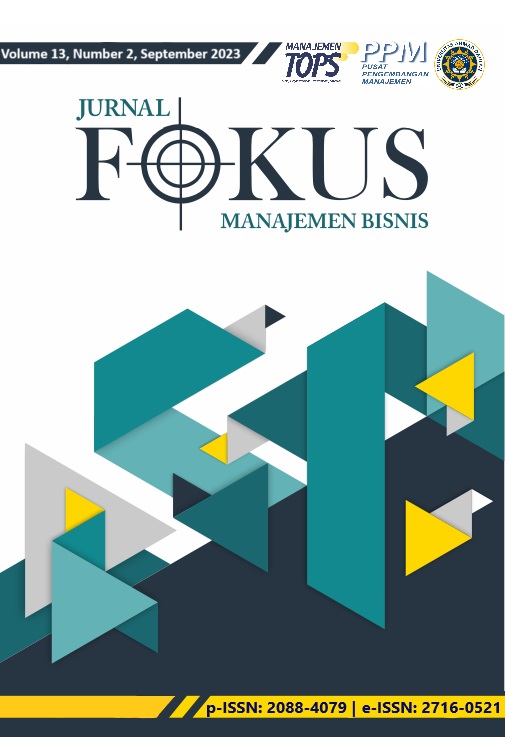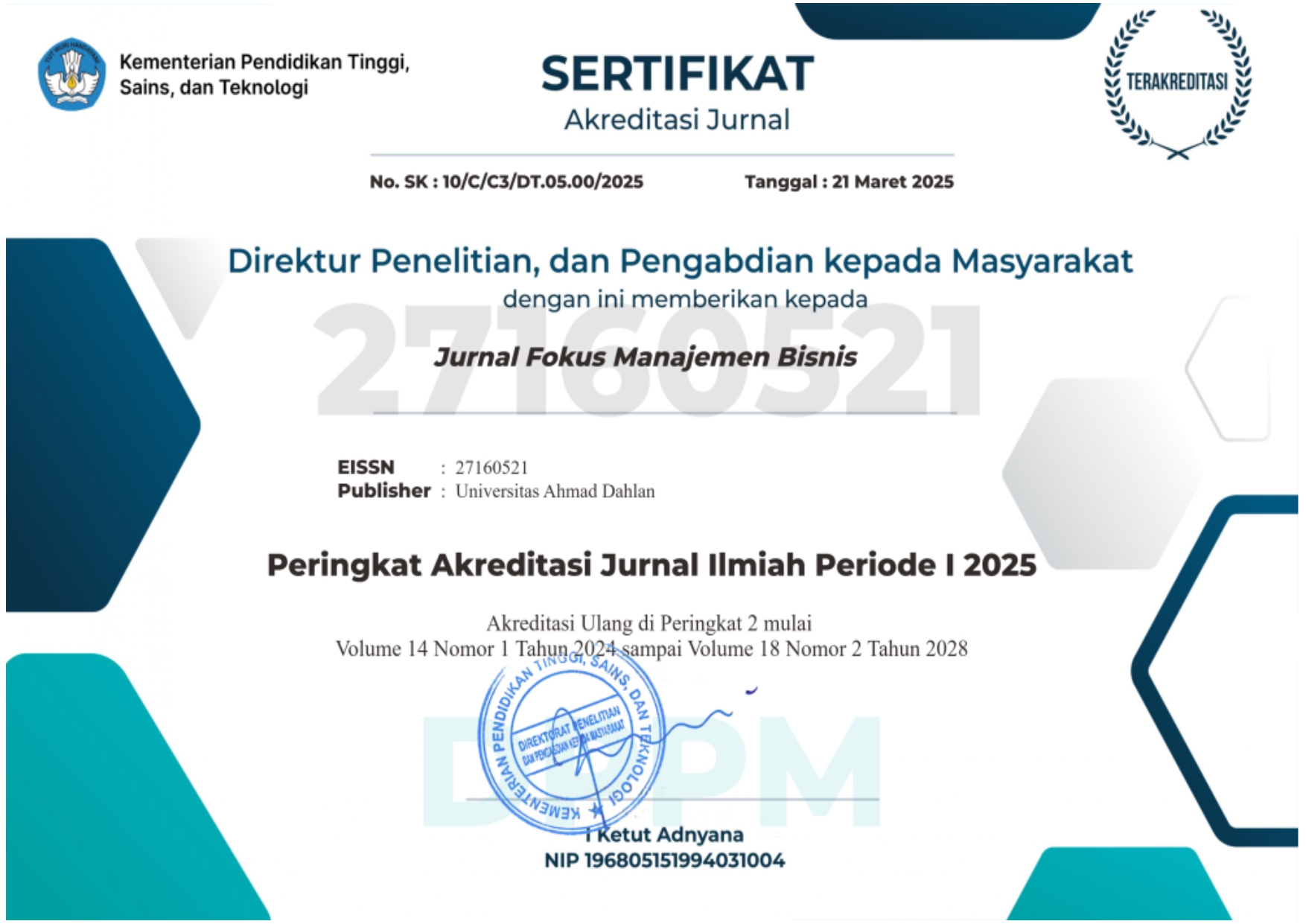The influence of perceived creativity and positive emotions on relationship quality: The mediating role of interaction
DOI:
https://doi.org/10.12928/fokus.v13i2.8723Abstract
Online grocery shopping offers a convenient shopping experience, but service providers must be creative in meeting customers' needs and delivering a positive shopping experience. This research examines the influence of perceived creativity and positive emotions on interaction and, subsequently, relationship quality. The study also analyses the mediation role of interaction in the relationship between perceived creativity and connection quality and the relationship between positive emotions and relationship quality. A survey was conducted with 288 respondents to investigate the relationships among the variables. The data collected were analyzed using structural equation modelling. The results show that perceived creativity and positive emotions directly influence relationship quality. Furthermore, perceived imagination and positive emotions indirectly affect relationship quality through interaction. These findings suggest that online grocery shopping platform providers can leverage consumers' creative perceptions and positive emotions to create exchanges that can be used to build a quality relationship between service providers and consumers.
References
Abdelfattah, F., Al Halbusi, H., & Al-Brwani, R. M. (2022). Influence of Self-Perceived Creativity and Social Media Use in Predicting E-entrepreneurial Intention. International Journal of Innovation Studies, 6(3), 119–127. https://doi.org/10.1016/j.ijis.2022.04.003
Amanah, D., & Harahap, D. A. (2019). Loyalitas Konsumen: Implikasi dari Diferensiasi Produk dan Nilai Emosional. Jurnal Ilmiah Manajemen Dan Bisnis, 20(1), 15–26. https://doi.org/10.30596/jimb.v20i1.2991
Antwi, S. (2021). “I Just Like This E-Retailer”: Understanding Online Consumers Repurchase Intention From Relationship Quality Perspective. Journal of Retailing and Consumer Services, 61. https://doi.org/10.1016/j.jretconser.2021.102568
Asti, W. P., Handayani, P. W., & Azzahro, F. (2021). Influence of Trust, Perceived Value, and Attitude on Customers’ Repurchase Intention for E-Grocery. Journal of Food Products Marketing, 27(3), 157–171. https://doi.org/10.1080/10454446.2021.1922325
Bayuardie, D., & Nisa, P. C. (2023). Hubungan antara Emotional Intelligence, Kualitas Layanan, Kepuasan Pelanggan, dan Loyalitas Pelanggan pada Karyawan Kedai Makanan dan Minuman. Journal of Advances in Digital Business and Entrepreneurship, 2(02), 1-17.
Busalim, A. H., Ghabban, F., & Hussin, A. R. C. (2021). Customer Engagement Behaviour on Social Commerce Platforms: An Empirical Study. Technology in Society, 64. https://doi.org/10.1016/j.techsoc.2020.101437
Casaló, L. V., Flavián, C., & Ibáñez-Sánchez, S. (2021). Be Creative, My Friend! Engaging Users on Instagram by Promoting Positive Emotions. Journal of Business Research, 130, 416–425. https://doi.org/10.1016/j.jbusres.2020.02.014
Cook, K. S., & Rice, E. (2006). Handbook of Social Psychology: Social Exchange Theory. University of Wisconsin Madison. https://doi.org/10.1007/0-387-36921-x
De Kerviler, G., & Rodriguez, C. M. (2019). Luxury Brand Experiences and Relationship Quality for Millennials: The Role of Self-Expansion. Journal of Business Research, 102. https://doi.org/10.1016/j.jbusres.2019.01.046
Dorai, S., Balasubramanian, N., & Sivakumaran, B. (2021). Enhancing Relationships in E-tail: Role of Relationship Quality and Duration. Journal of Retailing and Consumer Services, 58. https://doi.org/10.1016/j.jretconser.2020.102293
Du, J., An, Y., Ding, X., Zhang, Q., & Xu, W. (2019). State Mindfulness and Positive Emotions in Daily Life: An Upward Spiral Process. Personality and Individual Differences, 141(122), 57–61. https://doi.org/10.1016/j.paid.2018.11.037
Fadhila, S., Lie, D., Wijaya, A., & Halim, F. (2020). Pengaruh Sikap Konsumen dan Persepsi Konsumen Terhadap Keputusan Pembelian pada Mini Market Mawar Balimbingan. SULTANIST: Jurnal Manajemen dan Keuangan, 8(1), 53–60. https://doi.org/10.37403/sultanist.v8i1.177
Farah, H. (2021). Pergerseran Perilaku, Dorong Pertumbuhan Layanan E-Groceries Indonesia. Katadata. https://katadata.co.id/ekarina/infografik/617a6a52e2fb1/pergerseran-perilaku-dorong-pertumbuhan-layanan-e-groceries-indonesia
Fornell, C., & Larcker, D. (1981). Mengevaluasi Model Persamaan Struktural dengan Variabel yang Tidak Dapat Diamati dan Kesalahan Pengukuran. Jurnal Riset Pemasaran, 18, 39–50.
Ghozali, I. (2008). Structural Equation Modeling: Metode Alternatif Dengan Partial Least Square (PLS). Badan Penerbit Universitas Diponegoro.
Goetz, T., Bieleke, M., Gogol, K., van Tartwijk, J., Mainhard, T., Lipnevich, A. A., & Pekrun, R. (2021). Getting Along and Feeling Good: Reciprocal Associations between Student-Teacher Relationship Quality and Students’ Emotions. Learning and Instruction, 71. https://doi.org/10.1016/j.learninstruc.2020.101349
Hair, J. F., Risher, J. J., Sarstedt, M., & Ringle, C. M. (2019). When to Use and How to Report The Results of PLS-SEM. European Business Review, 31(1), 2–24. https://doi.org/10.1108/EBR-11-2018-0203
Huang, Y. C., Backman, S. J., Backman, K. F., & Moore, D. W. (2013). Exploring User Acceptance of 3D Virtual Worlds in Travel and Tourism Marketing. Tourism Management, 36, 490–501. https://doi.org/10.1016/j.tourman.2012.09.009
Hudson, S., Huang, L., Roth, M. S., & Madden, T. J. (2016). The Influence of Social Media Interactions on Consumer-Brand Relationships: A Three-Country Study of Brand Perceptions and Marketing Behaviors. International Journal of Research in Marketing, 33(1), 27–41. https://doi.org/10.1016/j.ijresmar.2015.06.004
Jahng, J., Jain, H., & Ramamurthy, K. (2007). Effects of Interaction Richness on Consumer Attitudes and Behavioral Intentions in E-Commerce: Some Experimental Results. European Journal of Information Systems, 16(3), 254–269. https://doi.org/10.1057/palgrave.ejis.3000665
Keiningham, T. L., Rust, R. T., Lariviere, B., Aksoy, L., & Williams, L. (2018). A Roadmap for Driving Customer Word-of-Mouth. Journal of Service Management, 29(1), 2–38. https://doi.org/10.1108/JOSM-03-2017-0077
Kurniasari, F., & Ryadi, W. T. (2021). Determinants of Indonesian E-Grocery Shopping Behavior After Covid-19 Pandemic Using the Technology Acceptance Model Approach. United International Journal for Research & Technology, 3(01), 12-18.
Lee, J., Lee, Y., & Lee, Y. J. (2012). Do Customization Programs of E-Commerce Companies Lead to Better Relationships with Consumers? Electronic Commerce Research and Applications, 11(3), 262–274. https://doi.org/10.1016/j.elerap.2011.10.004
Li, G. (2020). The Impact of Supply Chain Relationship Quality on Knowledge Sharing and Innovation Performance: Evidence from Chinese Manufacturing Industry. Journal of Business and Industrial Marketing, 36(5), 834–848. https://doi.org/10.1108/JBIM-02-2020-0109
Lin, H., Chi, O. H., & Gursoy, D. (2020). Antecedents of Customers’ Acceptance of Artificially Intelligent Robotic Device Use in Hospitality Services. Journal of Hospitality Marketing and Management, 29(5), 530–549. https://doi.org/10.1080/19368623.2020.1685053
Maisaroh, S., & Wibisono, T. (2022). Pengaruh Media Sosial, Kepercayaan, dan Persepsi Manfaat terhadap Keputusan Pembelian Online. Jurnal Fokus Manajemen Bisnis, 12(1), 16–29. https://doi.org/10.12928/fokus.v12i1.5708
Mighfar, S. (2015). Social Exchange Theory: Telaah Konsep George C. Homans Tentang Teori Pertukaran Sosial. LISAN AL-HAL: Jurnal Pengembangan Pemikiran dan Kebudayaan, 9(2), 259-282. https://doi.org/10.35316/lisanalhal.v9i2.98
Miller, P. G., Johnston, J., Dunn, M., Fry, C. L., & Degenhardt, L. (2010). Comparing Probability and Non-Probability Sampling Methods in Ecstasy Research: Implications for The Internet as A Research Tool. Substance Use and Misuse, 45(3), 437–450. https://doi.org/10.3109/10826080903452470
Mulyadi, M. (2013). Penelitian Kuantitatif dan Kualitatif serta Pemikiran Dasar Menggabungkannya. Jurnal Studi Komunikasi Dan Media, 15(1), 128. https://doi.org/10.31445/jskm.2011.150106
Nadeem, W., Juntunen, M., Shirazi, F., & Hajli, N. (2020). Consumers' Value Co-Creation in Sharing Economy: The Role of Social Support, Ethical Perceptions and Relationship Quality. Technological Forecasting and Social Change, 151,. https://doi.org/10.1016/j.techfore.2019.119786
Pappas, I. O., Kourouthanassis, P. E., Giannakos, M. N., & Chrissikopoulos, V. (2017). Sense and Sensibility in Personalized E-Commerce: How Emotions Rebalance the Purchase Intentions of Persuaded Customers. Psychology and Marketing, 34(10), 972–986. https://doi.org/10.1002/mar.21036
Pasi, L. N. K., & Sudaryanto, B. (2021). Analisis Pengaruh Online Customer Reviews dan Kualitas Pelayanan terhadap Keputusan Pembelian dengan Kepercayaan sebagai Variabel Intervening (Studi pada Konsumen Shopee di Kota Semarang). Diponegoro Journal of Management, 10(4). https://ejournal3.undip.ac.id/index.php/djom/article/view/32369
Preston, C. C., & Colman, A. M. (2000). Optimal Number of Response Categories in Rating Scales: Reliability, Validity, Discriminating Power, and Respondent Preferences. Acta Psychologica, 104(1), 1–15. https://doi.org/10.1016/S0001-6918(99)00050-5
Rajabi, M., & Gharcheh, M. (2022). The Effect of Perceived Creativity of Sports Store Instagram Posts on the Interactive Intention of Followers With the Mediating Role of Affective Commitment. Research in Sport Management and Marketing, 3(3), 35-46.
Rukmayanti, R., & Fitriana, F. (2022). Pengaruh Kualitas Produk, Harga, dan Promosi terhadap Keputusan Pembelian. Jurnal Fokus Manajemen Bisnis, 12(2), 206–217. https://doi.org/10.12928/fokus.v12i2.6671
Ryadi, W. T., Kurniasari, F., & Sudiyono, K. A. (2021). Factors Influencing Consumer’s Intention Towards E-Grocery Shopping: An Extended Technology Acceptance Model Approach. Economics, Management and Sustainability, 6(2), 146–159. https://doi.org/10.14254/jems.2021.6-2.11
Santouridis, I., & Veraki, A. (2017). Customer Relationship Management and Customer Satisfaction: The Mediating Role of Relationship Quality. Total Quality Management and Business Excellence, 28(9–10), 1122–1133. https://doi.org/10.1080/14783363.2017.1303889
Sheikh, Z., Yezheng, L., Islam, T., Hameed, Z., & Khan, I. U. (2019). Impact of Social Commerce Constructs and Social Support on Social Commerce Intentions. Information Technology and People, 32(1), 68–93. https://doi.org/10.1108/ITP-04-2018-0195
Singh, S., & Srivastava, S. (2019). Engaging Consumers in Multichannel Online Retail Environment: A Moderation Study of Platform Type on Interaction of E-Commerce and M-Commerce. Journal of Modelling in Management, 14(1), 49–76. https://doi.org/10.1108/JM2-09-2017-0098
Snijders, I., Rikers, R. M. J. P., Wijnia, L., & Loyens, S. M. M. (2018). Relationship Quality Time: The Validation of A Relationship Quality Scale In Higher Education. Higher Education Research and Development, 37(2), 404–417. https://doi.org/10.1080/07294360.2017.1355892
Srivastava, M., & Kaul, D. (2014). Social Interaction, Convenience and Customer Satisfaction: The Mediating Effect of Customer Experience. Journal of Retailing and Consumer Services, 21(6), 1028–1037. https://doi.org/10.1016/j.jretconser.2014.04.007
Tajvidi, M., Wang, Y., Hajli, N., & Love, P. E. D. (2021). Brand Value Co-Creation in Social Commerce: The Role of Interactivity, Social Support, and Relationship Quality. Computers in Human Behavior, 115. https://doi.org/10.1016/j.chb.2017.11.006
Thornberg, R., Forsberg, C., Hammar Chiriac, E., & Bjereld, Y. (2022). Teacher–Student Relationship Quality and Student Engagement: A Sequential Explanatory Mixed-Methods Study. Research Papers in Education, 37(6), 840–859. https://doi.org/10.1080/02671522.2020.1864772
Ulrich, M., Jahnke, H., Langrock, R., Pesch, R., & Senge, R. (2021). Distributional Regression for Demand Forecasting in E-Grocery. European Journal of Operational Research, 294(3), 831–842. https://doi.org/10.1016/j.ejor.2019.11.029
Weng, D., & Zhao, J. (2020). Positive Emotions Help Rank Negative Reviews In E-Commerce. arXiv preprint arXiv:2005.09837. https://doi.org/10.48550/arXiv.2005.09837
Wibowo, A., Chen, S. C., Wiangin, U., Ma, Y., & Ruangkanjanases, A. (2021). Customer Behavior as an Outcome of Social Media Marketing: The Role of Social Media Marketing Activity and Customer Experience. Sustainability (Switzerland), 13(1), 1–18. https://doi.org/10.3390/su13010189
Yin, J. (2019). Study on The Progress of Neural Mechanism of Positive Emotions. Translational Neuroscience, 10(1), 93–98. https://doi.org/10.1515/tnsci-2019-0016
Yoon, J. K., Pohlmeyer, A. E., Desmet, P. M. A., & Kim, C. (2021). Designing for Positive Emotions: Issues and Emerging Research Directions. Design Journal, 24(2), 167–187. https://doi.org/10.1080/14606925.2020.1845434
Zannuba, S. H., & Prawitasari, D. (2022). Pengaruh Gaya Hidup dan Kualitas Pelayanan melalui Kepuasan Konsumen terhadap Minat Beli Ulang. Jurnal Fokus Manajemen Bisnis, 12(2), 176–193. https://doi.org/10.12928/fokus.v12i2.6640
Downloads
Published
How to Cite
Issue
Section
License
Copyright (c) 2023 Burhanudin Burhanudin, Shinta Nufus Aulia

This work is licensed under a Creative Commons Attribution-ShareAlike 4.0 International License.
Authors who publish with this journal agree to the following terms:Â
- Authors retain copyright and grant the journal right of first publication with the work simultaneously licensed under a Creative Commons Attribution License that allows others to share the work with an acknowledgment of the work's authorship and initial publication in this journal.
- Authors are able to enter into separate, additional contractual arrangements for the non-exclusive distribution of the journal's published version of the work (e.g., post it to an institutional repository or publish it in a book), with an acknowledgment of its initial publication in this journal.
- Authors are permitted and encouraged to post their work online (e.g., in institutional repositories or on their website) prior to and during the submission process, as it can lead to productive exchanges, as well as earlier and greater citation of published work (See The Effect of Open Access).







